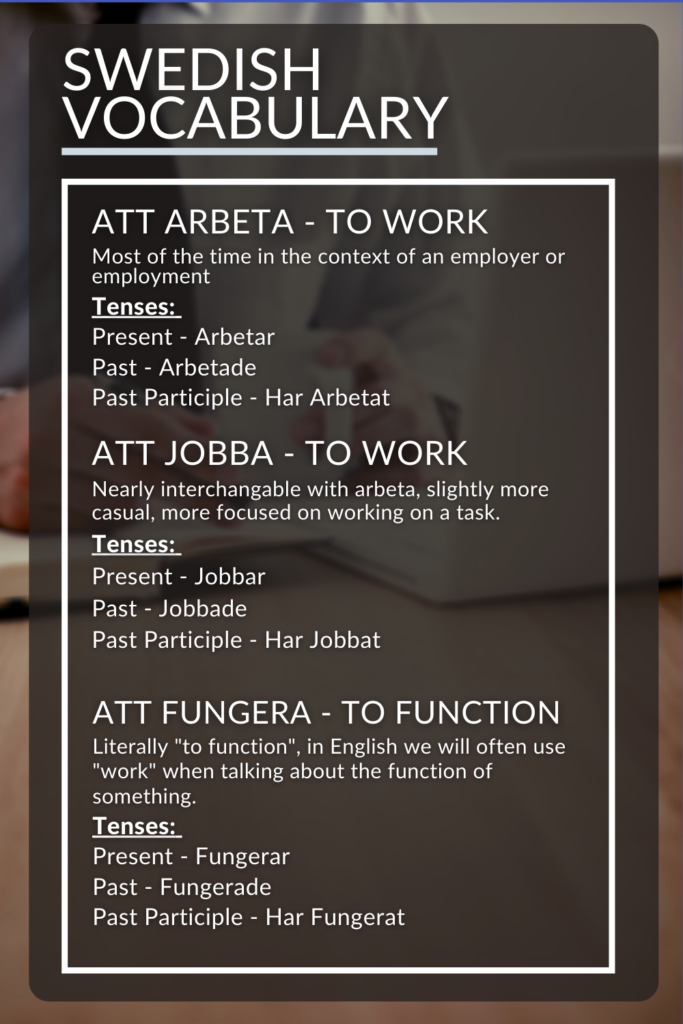Swedish Words for Work, and How to Use Them
Like so many others right now, over the last few months I’ve once again found myself searching for a job. Having moved to Sweden just over a year ago, this is a pretty big challenge. Part of the reason I started this blog has been as a way to structure my Swedish study to quickly get up to a work-fluent level.
As this has been a looming topic on my mind, I naturally started to wonder about the different Swedish words and phrases for work, jobs, and employment. This one has been another deep-dive into the history of these words, so I hope you find them as fascinating as I do! Don’t forget to check out my last article about how to use words for “doing” and “making” things. This post will continue on that theme of different ways to describe basic actions.

As always, I’m still learning too so please send me suggestions, corrections, advice, and any other help you’d like to send my way. This is centered on an English speaking perspective, but I try to mix in as many other languages as I can verify. Oh and get comfortable, because I really went down a lot of different rabbit holes on this one. In fact I’ll break this article up into two parts. The first will be translations and examples, then a second part on the history and etymology of work related words.
Part 1 – Swedish to english translations for Different types of work
If you’ve studied Swedish for any amount of time, you’ll have learned that it just doesn’t work to just plug a word into Google Translate and expect to use the result as a replacement for the English word. I’ll try to break down some of the different ways we use the word “work” in English, and apply them to their equivalent Swedish phrases.
How do I talk about Employment in swedish?
Arbete is the Swedish word most literally meaning “work” in the sense of employment. If you need to read through a Swedish employment contract you’ll find that your employer is your “arbetsgivare” (think work-giver), and you are the “arbetstagare” (work-taker, although there are more common words for employee such as “anställd”). Your workplace is an “arbetsplats”, and if you become unemployed you are “arbetslös” (think of that one like “work-less”. You can check out my previous article about Swedish words with the “lös/less suffix here).
There is also the verb form “att arbeta” meaning “to work”, so I’ll post a conjugation list for all the verb forms I mention at the end of the post.
more casual Swedish phrases: “at work”, “work with”, etc.
Slightly more casual in use, “jobba” will be familiar to English speakers as being similar to “job”, but it gets a little trickier in practice. One example is “Jag jobbar på ____”. It’s easy to assume “jobbar på” simply means “work on”, and it can be used this way, but most of the time it’s closer to “work for” or “work at”. You’re telling someone where you work. For example “Jag jobbar på Pepsi” can be translated to English as either “I work for Pepsi”, or “I work at Pepsi”, and either way would be easily understood. To get closer to the English “worked on” as in, “I worked on the project”, you would use “Jag jobbade med projektet”.
This sounds pretty close to “I worked with” to us English speakers, and can be used in that sense as well. You can say “Jag jobbar med farliga kemikalier” (I work with dangerous chemicals), but also in the sense of working with a particular person, as in “Jag jobbar med Erik” (I work with Erik).
But what about saying something like “I’m at work”? You can use the noun form too, and it’s a nice and simple one to use as a practice “ett” word. A job is “ett jobb”. Being “at work” you would say “på jobbet” (on the job), which is a little clunky in English, but a perfectly normal Swedish phrase. When someone finally decides to hand me a contract for one of my many skills, I can celebrate by saying “Jag fick ett jobb!!” (I got a job!!).
Jobb can also be used for a specific task, very similar to how it is in English. “Gör ditt jobb” (do your job).
How to use the word “verk”
Now on to the “work” word that sounds closest to the English version – “verk”.
It might sound like someone doing a bad Swedish Chef impression, but this W to V sound shift is one of the most common giveaways that a Swedish word and an English word share common roots. They don’t always keep the same exact meanings, but the general idea stays pretty close.
“Verk” can mean a staggering variety of things, most of which we actually use in nearly the same sense in English. “Konstverk” means artwork or a work of art (“konst” came from the Germanic word for art, where English took “art” from a Latin root). “Hantverk” is a term for a handcraft or product of a skilled trade. You can liken this to “handiwork”. “Verkstad” is a pretty close equivalent to “workshop”, for example you can call a mechanic’s shop a “bilverkstad”. There is “järnverk” for ironwork (more on that in the history section), and the list goes on and on. By now the connection to things produced by hand and by skilled craftsmen should be apparent, and even exists in the verb “att tillverka” meaning to produce or manufacture something. But there is another context that you may have come across without even realizing it.
public works and agencies
If you plan to or have moved to Sweden, you may have had an encounter (good or bad) with a little agency called “Migrationsverket”. Usually translated as “migration agency”, lets take a look at the “verket” at the end of the word. That’s something you’ll see in the name of almost every government agency and office you’ll need to visit in Sweden. In that context of a public agency, “verket” makes a little more sense as “works”, as in a department of public works. Agency is probably still a better translation in English, but it’s still useful to see the connection and make sense of public department names.
So we can think of “Migrationsverket” as “the migration works”, or “Skatteverket” as “the tax works” (“skatt” means “tax” or “treasure”). “Trafikverket” is the transportation agency, “Jordbruksverket” is the agricultural agency (“jord”-earth/dirt, “bruk”-use), “Arbetslivsverket” is the work environment authority, and the list continues like that. Take a look at the list of Swedish government agencies and see how that method of breaking down the names makes it easier to understand what they do.
asking how things work
The final variety of “work” words I’d like to talk about is about how things function. “Att fungera” literally translates as “to function”, and it ultimately comes from the same root in Latin, but it’s typical for English speakers to simply want to ask “how does it work”. We wouldn’t normally think to use the word function, even though that’s correct English. In Swedish you need to be a little more specific and ask “hur fungerar det?” (how does it work). In speech you’ll hear this pronounced most of the time as “funkar”, so be on the lookout for that, as I didn’t realize they were the same word for quite a while.
Coming soon – Part 2 – Swedish and English language history
Now that you have some basic understanding of the context for words that mean “work” and how to use them, I’ll get into the history of how they’re related in my next post. There are related words for career, path, cars, carts, robots, and having energy, all tying back to the same few root words for work.
Thanks so much for reading these! I love doing this kind of research. If you bookmark this page, I’ll link it here, and also post on social media within the next few days. I finally have a Facebook page set up where I’ll post these articles, and you can find that here.
Tack så jättemycket!
Bonus – Verb Conjugations


Tack
My name is Ahmad
I’m a teacher
This is the first time I am getting familiar with the Swedish language. It’s a very interesting yet helpful article to learn simple Swedish. Can’t wait for the next article! Jobb bra gjort.😊